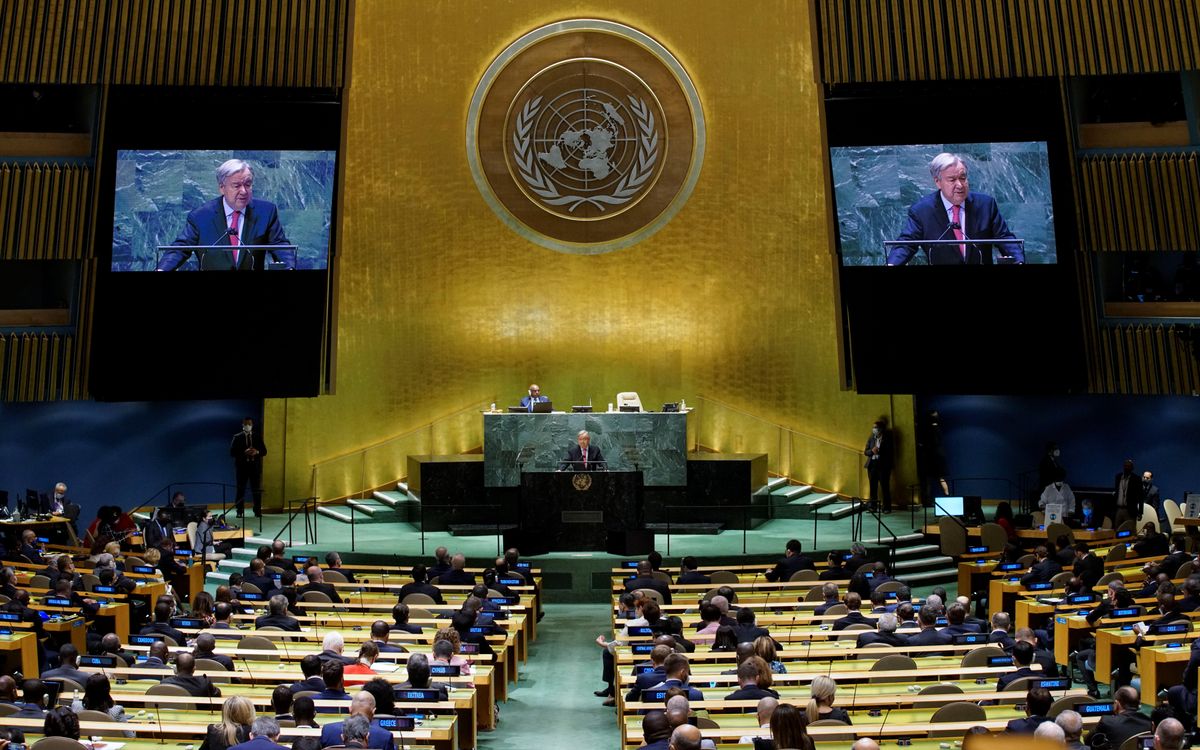Well, we're in the thick of "high-level week" for the United Nations General Assembly, known as UNGA. As always, the busiest few days in global diplomacy are about more than just speeches and hellish midtown traffic in Manhattan. Here are a few things we are keeping an eye on as UNGA reaches peak intensity over in Turtle Bay.
Biden's COVID Summit: The US president wants to "vaccinate the world" — but who precisely is going to do that? On the sidelines of UNGA, Biden is holding a virtual COVID summit on Wednesday in hopes of hashing out a more coordinated global pandemic response. That includes expanding the production and distribution of vaccines and medical equipment, investing in healthcare infrastructure, and establishing global benchmarks for pandemic progress. One target is to vaccinate 70 percent of adults in the world by September 2022. A lofty goal, as the current mark is barely 30 percent. Part of the problem is that wealthy countries have bought up lots of shots to vaccinate their own people first. And although the US has donated more vaccines globally than any other country, Biden's own administration is now weighing whether to recommend boosters at home. If the US does so, it'll be hard for other rich countries' governments to say no to boosters for their own people — meaning fewer shots available for billions of unvaccinated folks in poorer countries. Can Biden square all of these circles?
Hustling to revive Iran nuclear talks: Talks between the US and Iran have stalled since Iran's hardline president Ebrahim Raisi took power in June. But there are signs that side hustles aimed at getting negotiations back on track are afoot at UN HQ this week. On Monday, UK foreign secretary Liz Truss met with her Iranian counterpart Hossein Amir-Abdollahian — both are new to their posts — to chart a path forward on the nuclear front, as well as to discuss the release of arbitrarily detained British nationals. US President Joe Biden, meanwhile, told the General Assembly that Washington won't allow Tehran to build a bomb, but he is willing to return to compliance with the deal if Iran does the same. Tehran seems game to start talking again: Iran state TV confirmed this week that the long-stalled talks could resume negotiations in the coming weeks. This development comes just weeks after Iran, which has breached most of the nuclear deal's terms since former US President Donald Trump abandoned the deal in 2018, agreed to allow UN inspectors to monitor various sites linked to its nuclear program, sidestepping a threat of formal censure from the US, UK, France, and Germany if it failed to comply. Still, chasms remain between the two sides. Can sideline work at the UN narrow the gap?
Climate (in)security: Just a month ago, a new UN report called climate change a "code red for humanity." This week, there are two high-level meetings dedicated to doing something about it. First, the Security Council will hold a meeting Thursday morning on "climate and security." That's because climate change now threatens peace itself by heightening conflicts over increasingly scarce water and crops, and by exacerbating political tensions through forcing larger migrations of people fleeing war, famine, or flooding. Then, the UN hosts a high-level dialogue on Energy, where countries will try to hash out more detailed approaches to cutting carbon emissions. All of this is really just a warmup for the UN's COP 26 meeting in November, the critical forum for addressing that Code Red alert. Outside of the meetings, a big announcement from Xi Jinping: China, the world's top polluter, will stop building coal-fired plants everywhere... except in China.
Should governments set limits on the use of artificial intelligence? Definitely, says UN human rights chief Michelle Bachelet, who's asking member states to hold off on further development of AI technology until all the "negative, even catastrophic" risks that come with it can be ironed out. But it's hard to imagine strong agreement from countries like China, the US, or Israel which already have powerful AI industries and are wary of handcuffing them with global regulation. Still, there's no question that AI can cause harm in a number of ways, from algorithms that codify harmful biases all the way up to AI-driven killing machines (Israel recently built a doozy to kill Iran's top nuclear scientist). UN Secretary General Antonio Guterres mentioned AI specifically in his speech on Tuesday, let's see if it crops up elsewhere in the next few days.

















